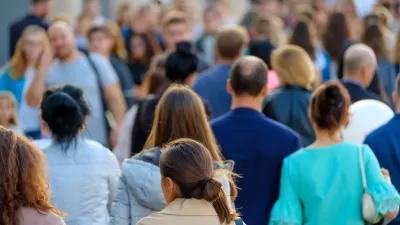Ryan Sager looks at the results of two recent studies that explore the ways in which cities, commonly lauded as bastions of diversity, actually incubate groupthink.
Sager discusses the results of studies on cell phone preference by researchers from the Norwegian telecom provider Telenor, and friendship networks at different sized colleges, conducted by researchers at Wellesley College and the University of Kansas, that demonstrate "'small town' thinking can crop up as easily in the megalopolis as in Palookaville."
In the latter study of friendship networks, which has been replicated at the city scale but not yet published, researchers reached a surprising conclusion. "'People would expect in bigger and more diverse places you'd come into contact with a bigger and more diverse set of people,' says lead researcher Angela Bahns, a social psychologist at Wellesley. 'But you find the exact opposite.'"
According to Sager, these findings make sense. "It's simple, really: We like people who are like us. Social scientists call it the 'similarity-attraction effect,' and it influences everything from whom we date and hire to where we choose to live. The bigger the pond, the more likely we are-consciously or not-to swim around until we find a group of like and like-minded people."
FULL STORY: How Big Cities Can Lead to Small Thoughts

Alabama: Trump Terminates Settlements for Black Communities Harmed By Raw Sewage
Trump deemed the landmark civil rights agreement “illegal DEI and environmental justice policy.”

Planetizen Federal Action Tracker
A weekly monitor of how Trump’s orders and actions are impacting planners and planning in America.

The 120 Year Old Tiny Home Villages That Sheltered San Francisco’s Earthquake Refugees
More than a century ago, San Francisco mobilized to house thousands of residents displaced by the 1906 earthquake. Could their strategy offer a model for the present?

In Both Crashes and Crime, Public Transportation is Far Safer than Driving
Contrary to popular assumptions, public transportation has far lower crash and crime rates than automobile travel. For safer communities, improve and encourage transit travel.

Report: Zoning Reforms Should Complement Nashville’s Ambitious Transit Plan
Without reform, restrictive zoning codes will limit the impact of the city’s planned transit expansion and could exclude some of the residents who depend on transit the most.

Judge Orders Release of Frozen IRA, IIJA Funding
The decision is a victory for environmental groups who charged that freezing funds for critical infrastructure and disaster response programs caused “real and irreparable harm” to communities.
Urban Design for Planners 1: Software Tools
This six-course series explores essential urban design concepts using open source software and equips planners with the tools they need to participate fully in the urban design process.
Planning for Universal Design
Learn the tools for implementing Universal Design in planning regulations.
Clanton & Associates, Inc.
Jessamine County Fiscal Court
Institute for Housing and Urban Development Studies (IHS)
City of Grandview
Harvard GSD Executive Education
Toledo-Lucas County Plan Commissions
Salt Lake City
NYU Wagner Graduate School of Public Service





























